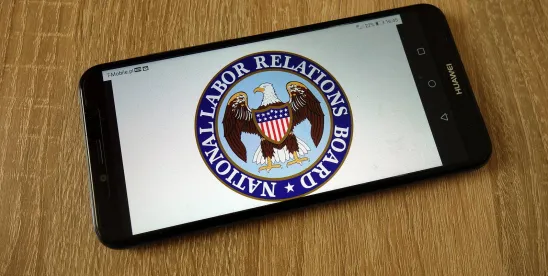On November 8, 2024, in Siren Retail Corp d/b/a Starbucks, the National Labor Relations Board (the “Board”) ruled that employers may violate the National Labor Relations Act (the “Act”) by making statements to workers regarding the impact that unionization would have on the relationship between employees and management, overruling nearly 40 years of NLRB precedent.
The Board’s decision in Starbucks sets forth the new test the Board will use going forward to evaluate whether employer predictions about the impact of unionization on the relationship between individual employees and management are unlawful threats under Section 8(a)(1) of the Act.
This is the Board’s first precedent-changing decision since former President Donald Trump was elected on November 5, 2024. The future composition of the Board is tenuous, as the nominations of current Chairman Laura McFerran and Joshua Ditelberg remain pending before the Senate; if the two nominees are confirmed before the lame-duck Senate, then the Democratic majority of the Board likely will remain intact until the next Board seat opens in 2026. If not, then President Trump will have the opportunity to tilt the Board to a Republican majority. In light of this uncertainty, and because Chairman McFerran’s term currently expires on December 16, 2024, we anticipate this will not be the last precedent-changing decision by the Board in favor of unions and employees that will be issued in the coming weeks.
Background
On January 31, 2023, Administrative Law Judge (“ALJ”) John Giannopoulos found that Starbucks made a series of unlawful threats to its workers during a union drive at the Company’s Seattle Roastery by telling them that unionization would be futile, would cause them to lose certain benefits, and that collective bargaining would not redress the employees’ current inability to receive tips from customers’ credit card payments.
In rendering the decision, the ALJ relied on the Board’s 1985 decision in Tri-Cast, Inc., 247 NLRB 377 (1985), which held that employers do not make unlawful threats by explaining to workers that “when they select a union to represent them, the relationship that existed between the employees and the employer will not be as before.” In other words, the Board in Tri-Cast deemed most employer statements about the impact of unionization on the relationship between individual employees and management to be categorically lawful.
Based on existing precedent from Tri-Cast, the ALJ also found that Starbucks did not violate the Act by engaging in the following activities during the organizing campaign:
- Providing manager statements concerning the impact unionization would have on the employees’ ability to address issues individually with management;
- Holding an employer-mandated campaign meeting; and
- Making statements concerning the duration of collective bargaining, including that it takes “on average a year to eighteen months” for the parties to reach an agreement.
The Board’s Decision
The Board’s decision largely affirmed the ALJ’s findings under the Tri-Cast precedent. However, prospectively, the Board opted to overrule nearly 40 years of Tri-Cast precedent, holding that Tri-Cast “erred in deeming categorically lawful nearly every employer statement to employees touching on the impact that unionization would have on the relationship between individual employees and their employer.”
The Board held that going forward it will analyze statements to employees about the impact of unionization on a “case-by-case basis” under the “same longstanding test it uses to evaluate other potentially threatening or coercive statements,” relying on the United States Supreme Court’s decision in NLRB v. Gissel Packing Co., 395 U.S. 575 (1969). In Gissel, the Court held that to be lawful, employer predictions regarding negative impacts on the employer from unionization “must be carefully phrased on the basis of objective fact to convey an employer’s belief as to demonstrably probable consequences beyond [its] control.” If an employer’s prediction is not fact-based or predicts negative consequences that stem from the employer’s own actions, it is “no longer a reasonable prediction based on available facts, but a threat of retaliation based on misrepresentation and coercion.”
The Board discussed the lawfulness of an employer statement that the nature of the relationship between employer and employee will change if the union prevails in an election. As a general matter, the Board agreed that Section 9(a) of the Act “contemplates a change in the manner in which employer and employee deal with each other.” However, the Board focused on statements made during an organizing campaign that would result in the loss of an existing benefit—for instance, in Tri-Cast, the statement the Board found lawful was that if the union wins, then the employer will not be able to handle personal requests as it has in the past. The current Board believes such a statement is unlawful, and that Tri-Cast was wrongly decided.
Critically, the Board noted that if a statement assessed under this standard violates Section 8(a)(1), “such a violation, depending on the circumstances, usually is also sufficient to set aside an election” under Cemex Construction Materials Pacific, LLC, 372 NLRB No. 130 (2023).
The Board declined the General Counsel’s request “at this time” to overrule Babcock & Wilcox, Co., 77 NLRB 577 (1948), which addresses the lawfulness of employer-mandated campaign meetings, and the Board also found it unnecessary to decide on whether Starbucks’ statement regarding the potential length of collective bargaining—which employers routinely use in organizing campaigns—violates the Act.
Takeaways
For the time being—i.e., under this current Board and General Counsel—employers no longer can feel comfort in the type of categorical protection from Tri-Cast that previously covered statements made to their employees about the prospects of unionization. Now, the Board will evaluate employer statements about the impact of unionization using a fact-specific, case-by-case approach, focusing on the extent to which the statements signify the loss of an existing benefit to which the employees are entitled and whether the employer statements are predicted on objective facts, rather than speculation. Given the high likelihood that a violation of the Act based on such statements could result in the setting aside of a favorable election result for an employer under Cemex, the stakes are particularly high.
However, in light of the significant uncertainty pervading the Board given President Trump’s recent victory, it remains to be seen how long this new state-of-play will remain in effect.




 />i
/>i

